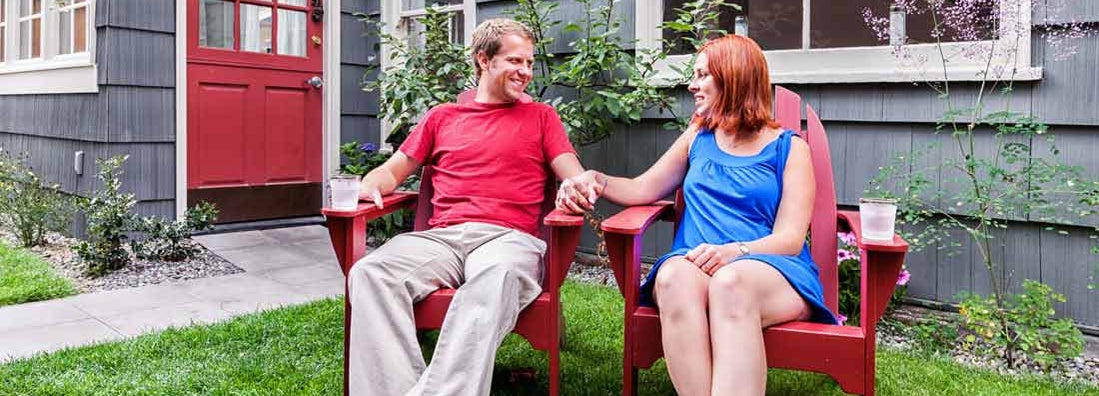Should I Rent or Buy a Home?

When it comes to your next home, the decision to rent or buy will be a big one -- huge, even. This will affect more than just the amount of money you'll be spending each month. It'll also determine if you have control over the property, how much you'll need up front, and who will be in charge of fixing things.
There are a number of open-ended factors, like how long you plan on staying and financial stability, that can clog up the decision-making process and possibly give you a serious case of I Don't Wanna Think About It-itis. Lucky for you, we're here to help you avoid a trip to the doctor and/or therapist.
We spoke to Ben Brown, a certified financial planner and enrolled agent for Entelechy, a registered investment advisory firm in Washington, DC, to help gather some expert insights on how to make the rent-or-buy decision easier… or at least less difficult.
How Long Do You Plan To Live There?
If you're planning to stay in the home long-term, it may be worth it to buy. You'll have the satisfaction of knowing that each month you chip away at your mortgage loan, and that you're getting closer to becoming the true owner of the home.
“The length of time you plan to stay in a home is one of the most important factors in your decision to rent or buy," said Ben.
This isn't possible when you rent. No matter how long you stay, you'll never really be able to call the property yours. It's kinda like throwing pennies into a mall fountain posing as a "wishing well," you'll never see that money again, nor will you ever get the pony.
However, Ben warns against getting carried away by the alluring (but misleading) idea that buying a house will be a great financial investment.
"I don't consider a house an investment. Housing is a basic need, and on average, home prices have historically barely kept up with inflation (or worse), particularly when accounting for the additional costs of home ownership - property taxes, insurance, maintenance, etc.," Ben said.
So it is possible to come out ahead in the long term, financially, when buying a home, but you shouldn't count on it, at least not to the extent that it becomes the most heavily weighted factor influencing your decision.
How Do Monthly Costs Compare?
When considering how hard your wallet would be hit each month, there are several free online tools that allow you to input specific values to determine the total damage (e.g., home price, mortgage rate, taxes).
Check out the New York Times’ calculator.
"However, not everyone is confident in what values they should enter for each variable, or how heavily they should weight a particular factor," said Ben.
He explained that this is an area where a financial planner could be a great asset in determining what you can afford, based on your unique situation.
Who Do You Want To Be Responsible for Maintenance?
The joys of home ownership can be easily interrupted by less-than-fun problems that arise when you least expect it. You may come home to discover that your toilet won't stop running, the ceiling won't stop leaking, or a totally gross invasion of mold is taking over the basement.
When you rent a property, repairs and their costs are the landlord's responsibility. They’re required to keep the property in habitable condition for their tenants, and to respond to maintenance needs at lightning speed (or in a reasonable time frame).
However, when you own a property, you take on the burden of home repairs. If the dishwasher breaks and it hasn't been figured into the monthly budget, you might be stuck hand-washing dishes (or stocking paper plates) until your next paycheck comes.
So if you proudly refer to yourself as your own Bob Vila or Tim "The Tool Man" Taylor, perhaps the maintenance side of your decision would make you lean towards buying.
How Much Money Will You Have To Put Down Up Front?
It's probably no surprise that a down payment on a home will be higher than the initial cost of renting a property.
"It's much easier to financially prepare yourself to rent than it is to prepare to buy," Ben said. "A landlord may check your credit score and ask for references, and you'll probably be required to pay a security deposit and the first month's rent".
However, buyers will need a down payment of 3%-20% of the home’s sale price, an amount that most likely will require years of saving up. While your savings are an important factor in whether you rent or buy, Ben warns not to place too much emphasis on this area in your decision.
"Most people weighing whether to rent or buy are too focused on a down payment - e.g., ‘If I've saved $X, then I can afford a house worth $Y!’ However, buying a house is much more about future cash flows (i.e., the impact of a large monthly mortgage payment, plus ongoing insurance, taxes and maintenance) than it is about current savings," Ben said.
Buyers will also need additional savings for closing costs and potential upgrades and renovations.
How Much Control Do You Want over the Property?
A big piece of the puzzle for many people when it comes to buying a home rather than renting is the amount of control owning gives them. Homeowners are able to have as many pets as they want, add additions as necessary for new (or freeloading) family members, and make use of their green thumb in their yard, if they so choose.
A landlord most likely will not allow you to turn the small patch of grass that comes with your home into a tiny baseball diamond or an herb garden, nor will they let you install a skateboard ramp in the living room. If creative control over your space matters a lot to you, you might lean towards buying.
How Expensive Will the Home Be Long-Term?
Of course, a new home won't just be a one-time payment - you'll be paying for it as long as you live there. For renters, this means the monthly cost of their rent plus any renter's insurance. For owners, it's the cost of their mortgage (and interest), homeowners insurance, property taxes and any maintenance fees that pop up.
Homeowners may find themselves trapped in a space until they have paid off their loan in full. Buying a house can be just as big a commitment as marriage - and leaving a house before paying off a loan can be a financial/stress headache similar to divorce.
"Home ownership is wonderful, but not if you ruin your financial life to pay for it," Ben said.
Rent or Buy -- The Choice Is Yours
So it all comes down to making the choice that is right for you. We know it's not an easy choice, and that there's lots to consider. We hope that this guide has helped shine some light on all those questions that were hiding in the dark corners of your mind.
A new place to call home will be a rewarding achievement, especially when you've made a well-informed decision to get there. Good luck and we believe in you.
Huge thanks to Ben Brown, certified financial planner and enrolled agent for Entelechy, for all the insights and answers.
